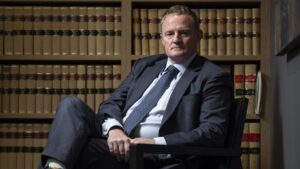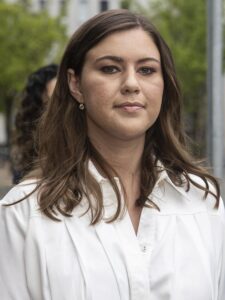An excellent frontpage article highlighting the problem where certain offences are attracting a view that the accused is already guilty, before trial. Applies to virtually any offences against women, including domestic violence and rape as in this case.
From the Australian Weekend newspaper 21May2023
-
EXCLUSIVE
By JANET ALBRECHTSEN COLUMNIST @jkalbrechtsen and STEPHEN RICE
NSW EDITOR @riceyontheroad
- UPDATED 9:53AM MAY 20, 2023, FIRST PUBLISHED AT 9:30PM MAY 19, 2023
The presumption of innocence and the right to due process have been dangerously warped by the #MeToo movement, Bruce Lehrmann’s lawyer Steven Whybrow SC has claimed, in his first interview since Mr Lehrmann went on trial over Brittany Higgins’ rape allegations.
“This was ‘Alice in Wonderland’. Sentence first or verdict first, trial later,” Mr Whybrow says of the pre-trial publicity around the case.
“There was so much material out there that was just simply ‘he’s guilty’ and we’ve just got to go through this process of a trial. I saw that as a significant undermining of the rule of law and the presumption of innocence and due process.
“We all know this happens all the time: this guy’s been accused of this, so therefore it happened. And along the way, anybody who tried to argue the contrary narrative was treated as somehow morally deficient.”
Mr Whybrow said that if there was to be a debate about the presumption of innocence or whether an accused person should not have a right to silence, “those things should actually happen in an informed way publicly, rather than this insidious suggestion that ‘that’s what the system is’”.
“But it’s not good. It’s not right,” he added.
READ MORE: ABC to argue ‘public interest’ in defamation case | Wilkinson ‘kept Bruce out of jail’ | Crown lager or Drumgold bitter? DPP calls beer o’clock | Battlelines are drawn, with police in focus | Drumgold ‘took a stab’ at Lehrmann: barrister | ‘Outrageous’: prosecutor’s texts over Higgins leak
Mr Whybrow’s comments came as Mr Lehrmann revealed for the first time that when he tried to get legal assistance for his defence, Legal Aid ACT insisted it would not allow Ms Higgins to be challenged in court as a liar, but simply “perhaps mistaken about versions of events”.
Mr Lehrmann told The Weekend Australian he sacked Legal Aid ACT after the agency demanded he adopt a conciliatory defence strategy that was completely at odds with his account of the events that occurred in senator Linda Reynolds’ ministerial office in the early hours of March 23, 2019.
Mr Lehrmann said a solicitor at the agency told him “it was up to the CEO of Legal Aid in terms of the broader tactics of the case and he was going to say that she’s not a liar but was mistaken about aspects of the version of events”.
Mr Lehrmann said the agency also rejected Mr Whybrow as “too aggressive” to take on the case.
THEAUSTRALIAN.COM.AU07:46EXCLUSIVE: Steven Whybrow SC on the trial of Bruce Lehrmann
Bruce Lehrmann’s defence barrister says if he were ever to write a book about the trial, he would call it…
The solicitor told him the agency would not fund Mr Whybrow as his counsel in the trial because “Legal Aid didn’t like the way Mr Whybrow practices or the way he operates”.
Mr Whybrow ultimately took on the case pro bono after Mr Lehrmann refused to accept the Legal Aid conditions.
A spokesperson for Legal Aid ACT declined to comment.
“Bruce was just horrified that they’re not even going to run his defence, which was: she’s lying, she made it up, this did not happen – and to just say, ‘oh no, you misunderstood, you were mistaken’,” Mr Whybrow said. “So he became very distressed.”
The former Crown prosecutor pursued a forceful approach at the trial, describing Ms Higgins as “unreliable” and someone “who says things to suit her”.
Mr Whybrow told jurors she had lied about seeing a doctor to “make it more believable” she had allegedly been sexually assaulted.
He outlined a number of instances when Ms Higgins was forced to concede she had given wrong evidence, including the length of time a white dress was kept in a plastic bag under her bed and a three-hour panic attack on a day she later conceded she had been having a valedictory lunch for former politician Steven Ciobo.
“The person bringing the allegation is prepared to just say anything,” Mr Whybrow told jurors.
The jury had been deliberating for five days, unable to agree on a verdict, when the trial was abruptly aborted after one of the jurors brought research material into the room.
Mr Whybrow told The Weekend Australian he had been concerned that, because of the pre-trial publicity, the defence would struggle to get 12 unbiased, unaffected jurors.
Bruce Lehrmann. Picture: NCA NewsWire / Gary Ramage
“In some respects, that was borne out by the number of people in the jury pool who quite properly, when the chief justice asked that anyone who thought they might have some pre-existing bias, either for or against the complainant or the accused, or had attended the March4Justice, or subscribed to particular views about sexual assault, or even had had own experiences, that meant that they could not bring a fair mind to the role of a juror to come forward.
“And a lot of people did, but we were never able to be sure that some of the people who didn’t come forward may have had strongly held views and were going to not come forward because they wanted to ensure justice – as they perceived it – would be done.”
Mr Whybrow expressed strong concerns over the role of ACT Victims of Crime Commissioner Heidi Yates, who often accompanied Ms Higgins to court.
“The problem in this case – and it’s not just my perception, it’s one that I know a lot of people have shared – is that by walking next to Ms Higgins into court every day as the statutory office holder of the position of the Victims of Crime Commissioner – and that would be videoed every morning, it would be in the papers and the news that night – it carried with it a less-than-subtle and a less-than-subconscious inference that Ms Higgins was in fact a victim.
“It was about as subtle as if Ms Yates had walked in wearing a T-shirt, saying ‘Bruce is guilty’, Mr Whybrow said.
THEAUSTRALIAN.COM.AU02:34’#Metoo has metastasised’
Steven Whybrow SC discusses the impact of media coverage on the judicial system and the rule of law.
“This case has demonstrated, in my view, an insidious and underappreciated issue, which is this conflict and this tension and this slow bracket creep between the presumption of innocence on the one hand, and ‘believe all women’ – or in a sexual assault case, ‘people don’t make anything up’ – that is undermining a presumption of innocence.”
Ms Yates declined to comment on Friday, and a spokeswoman for the ACT Human Rights Commission pointed to a previous statement in which it welcomed the set-up of the Sofronoff inquiry.
Mr Whybrow said he took on the case pro bono after Legal Aid ACT refused to hire him because “I wanted to be part of an attempt to at least give this man a fair trial in the face of what I and many other people had considered was such adverse publicity that he could never actually get a fair trial”.
Mr Lehrmann originally approached Legal Aid for help after his first lawyer, John Korn, was forced to withdraw for medical reasons.
Legal Aid also refused to fund the solicitor Mr Korn had recommended, Kamy Saeedi, saying it would assign an in-house lawyer.
Mr Lehrmann said he was stunned that the agency was demanding he accept a defence strategy that contradicted his account of what occurred in Parliament House after a night out drinking with colleagues in Canberra. Mr Lehrmann has consistently maintained, including in his statement to police, that there was no sexual contact of any kind with Ms Higgins and that after they got to Senator Reynolds’ suite, he went left and Ms Higgins turned right, and he didn’t see her again.
Brittany Higgins. Picture: NCA NewsWire / Gary Ramage
“It was basically Kamy who said to me, right, just fire them – he helped me write a letter firing them,” Mr Lehrmann told The Weekend Australian.
Mr Saeedi agreed to take on the case pro bono.
“This is a winnable case if we just do it how we need to, not how the Legal Aid wants to do it,” Mr Lehrmann recalls his new lawyer saying.
“He was concerned that I’m being led up the garden path and that they’ve got no idea, because they’re all so woke in Canberra,” Mr Lehrmann said.
“So he just said, I’m just going to do it pro bono now, let’s not worry about the money.”
Mr Whybrow also then agreed to act for Mr Lehrmann pro bono.
“It was, you know, we’ll keep an account going and you will likely never pay. We know that if you’re in jail we’re never going to get paid,” Mr Whybrow said. “And even if you’re acquitted, unless you win Lotto, we’re never going to get paid. But we will act for you.”
JANET ALBRECHTSEN
COLUMNIST
Janet Albrechtsen is an opinion columnist with The Australian. She has worked as a solicitor in commercial law, and attained a Doctorate of Juridical Studies from the University of Sydney. She has written for numer… Read more
STEPHEN RICE
NSW EDITOR
Stephen Rice started his newspaper career at The Sydney Morning Herald before moving into television, where he became executive producer of Nine’s Business Sunday programs. He has worked as a senior investigative p… Read more
Share this article
Related stories
- ABC to argue ‘public interest’ in defamation case
- Wilkinson ‘kept Bruce out of jail’
- Crown lager or Drumgold bitter? DPP calls beer o’clock






